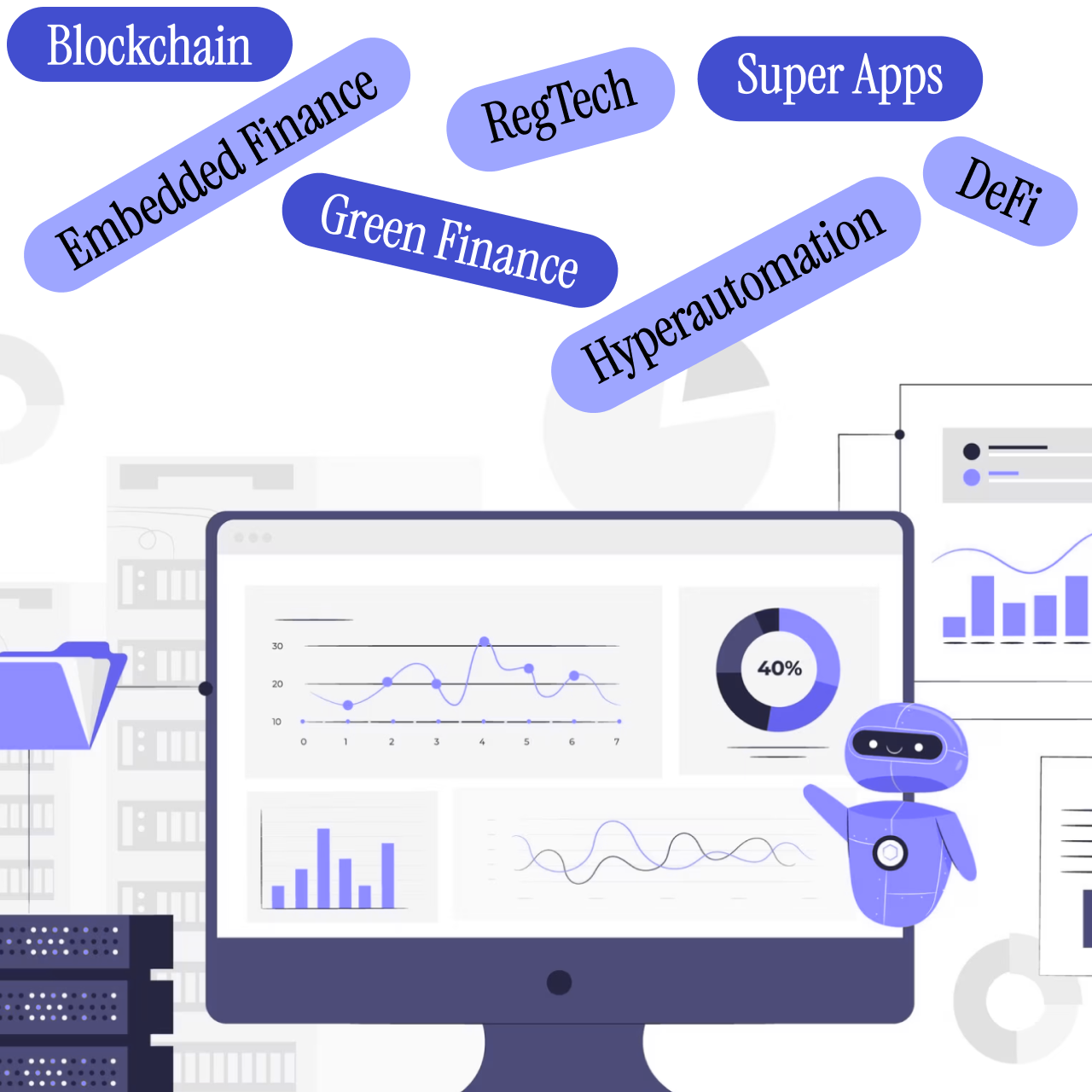Standing at the edge of 2025, the fintech world is undergoing a major transformation where finance and technology work together in ways that go far beyond basic digital transactions. What started as a focus on convenient payments has grown into a movement reshaping how technology drives financial systems worldwide.
As cutting-edge tools meet rising consumer expectations and adapt to shifting regulations, fintech isn’t just a sector anymore. It’s becoming a model for designing the future of global finance.
This article dives into the leading fintech trends poised to influence the industry. These are not just forecasts, they're reflections of the ongoing changes shaping how we handle money now and in the coming years.
Embedded Finance: The Financial Layer of Everyday Life
Embedded finance is the integration of financial services into nonfinancial platforms. This reshapes the user experiences and uncovers new revenue streams. From e-commerce giants extending instant credit to SaaS platforms offering in-app payment solutions, embedded finance is erasing the boundaries between financial and nonfinancial ecosystems. In 2025, industries like healthcare, retail, or mobility will adopt embedded finance at scale. This will boost consumer convenience and drive ecosystem partnerships across industries.
AI-Driven Personalization and Decision Intelligence
Artificial intelligence is an engine that drives fintech evolution. AI enhances the personalization of financial products – for example, now there are robo-advisors tailoring investment strategies and machine learning algorithms reimagining credit scoring. Analytics of real-time and intelligent decision-making will be the main instruments for enhancing customer satisfaction and operation effectiveness. The foresight of the market trends has been set forth by predictive analytics and, as a result, has been a trend that has kept a number of companies ahead of the competition.
Blockchain Beyond Cryptocurrencies
From its root in cryptocurrencies, blockchain is becoming one of the cornerstones of fintech innovation. The advancement in cross-border payments, smart contracts, and DeFi-starting applications does justice to the dynamics of transparency and efficiency. Tokenized assets and blockchain finance in the supply chain unlock new frontiers, building trust and reducing friction in financial operations. The role of blockchain in the reformation of global trade logistics by streamlining complex processes and enhancing accountability simply cannot be ignored.
Central Bank Digital Currencies (CBDCs)
Central banks are rapidly exploring and implementing digital currencies. CBDCs promise improvement in financial inclusions, facilitation of streamlined payment systems, and greater control of monetary policies by governments. While countries like China are leading in this, broader adoptions in 2025 will likely have implications across global trade and finance. Beyond efficiency, CBDCs could also pave the way for innovative financial products tailored to underserved populations.
RegTech: A Shield Against Regulatory Complexity
The regulatory environment is turning thicker, and compliance is looming high as the top priority of every financial institution. RegTech, with the use of AI and data analytics, can automate compliance processes, perform real-time risk assessments, and effectively manage audits. In the coming year, RegTech will mostly be a part of the Fintech core, protecting organizations from the consequences of non-compliance. It is also likely to evolve beyond mere compliance management to proactive predictive capabilities that shall help in mitigating risks proactively.
The Mainstreaming of Decentralized Finance (DeFi)
From a nascent concept, the idea of DeFi is becoming mainstream. It democratizes access to more financial services than ever before, like decentralized lending, borrowing, and trading. User-friendly platforms with robust security protocols will be key drivers in the adoption of DeFi in 2025. Additionally, it is believed that DeFi will unlock new income streams for institutions ready to integrate decentralized solutions into their portfolios.
Green Finance and ESG Prioritization
Sustainability is no longer a nice-to-have option and has become a strategic priority for organizations. Fintech platforms are at the forefront of developing Environmental, Social, and Governance Goals. From green bonds to carbon offset tracking tools, fintech empowers people and businesses to bring their financial decisions in tune with the aim of sustainability. Emphasis on green finance will further increase with time as stakeholders increasingly advocate for more responsible financial practices. The mobilization of capital by Fintech for climate-focused initiatives will be crucial in the attainment of global sustainability targets.
Hyperautomation: Redefining Operational Efficiency
Hyperautomation is bringing together AI, RPA, and machine learning to make back-office operations more efficient. This means tasks like fraud detection, loan processing, and customer onboarding are handled faster and more accurately. It also helps cut costs and improves the overall speed of operations, making systems smoother and more effective. In 2025, financial institutions will rely heavily on hyper-automation to smoothen workflows and boost productivity. More importantly, it will also free humans to focus on strategic decision-making and innovation.
Super Apps
Inspired by the huge success of Asia's super apps, such as WeChat and Grab, the idea is now spreading to the rest of the world. Super apps integrate different services into one place, from payments and investments to insurance, among others, which makes life easy for consumers. Driven by this, fintech companies will be in a race to provide end-to-end ecosystems, covering every aspect of customer's financial lives. This is more than convenience; it is a core change to one-stop platforms that lead to long-term customer relationships and loyalty.
Quantum Computing
Quantum computing, though in its infancy, is arguably the most transformative force in fintech. From unparalleled computational power that will revolutionize everything from risk modeling and portfolio optimization to fraud detection, it will also upend traditional cryptographic security. In 2025, fintech leaders will be investing in quantum-resilient encryption technologies while exploring this cutting-edge frontier for possibilities. Quantum computing will redefine high-frequency trading and complex derivatives markets by unleashing real-time data-driven insights.
The Road Ahead
The future of FinTech becomes abounding with possibilities. In a world where embedded finance, DeFi, and AI-driven insights have come to the fore, leading the way in innovating the space, the creation of inclusive, efficient, and transparent financial ecosystems will take a new turn. Businesses like Hummingwave, fully committed to pioneering digital solutions, may just provide this leadership behind the transformation. By keeping pace with such trends, value-driven innovation in response to changing business and consumer needs can be delivered.
2025 marks a turning point for fintech. The question is how boldly one can navigate this era of speedy innovation. Are you ready to shape the future of finance?


